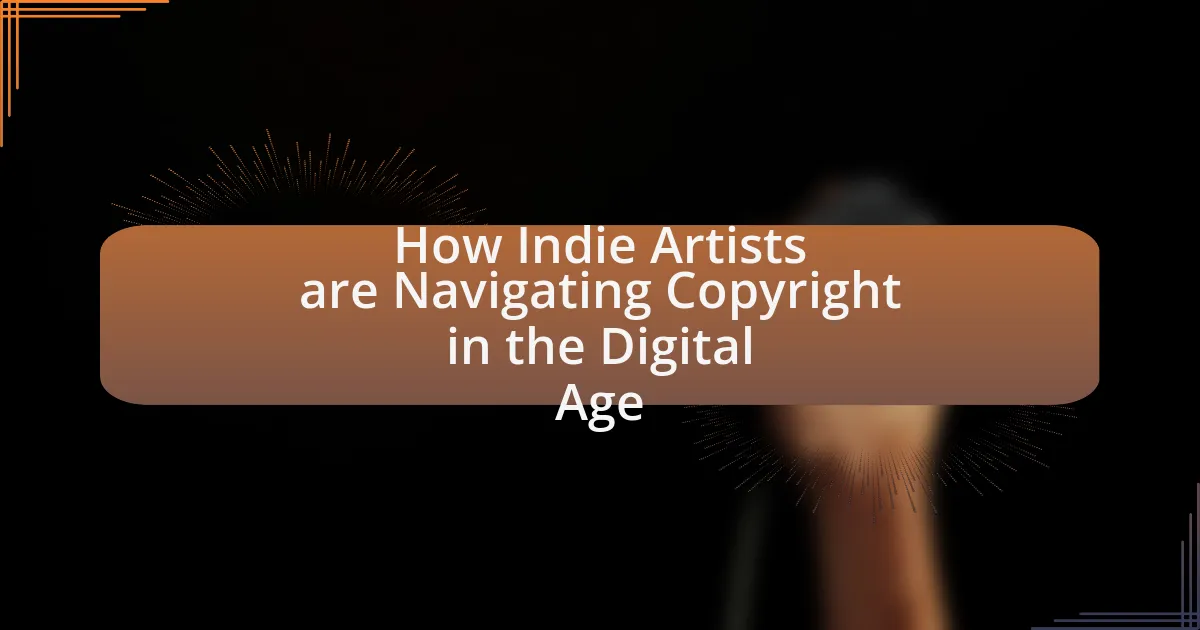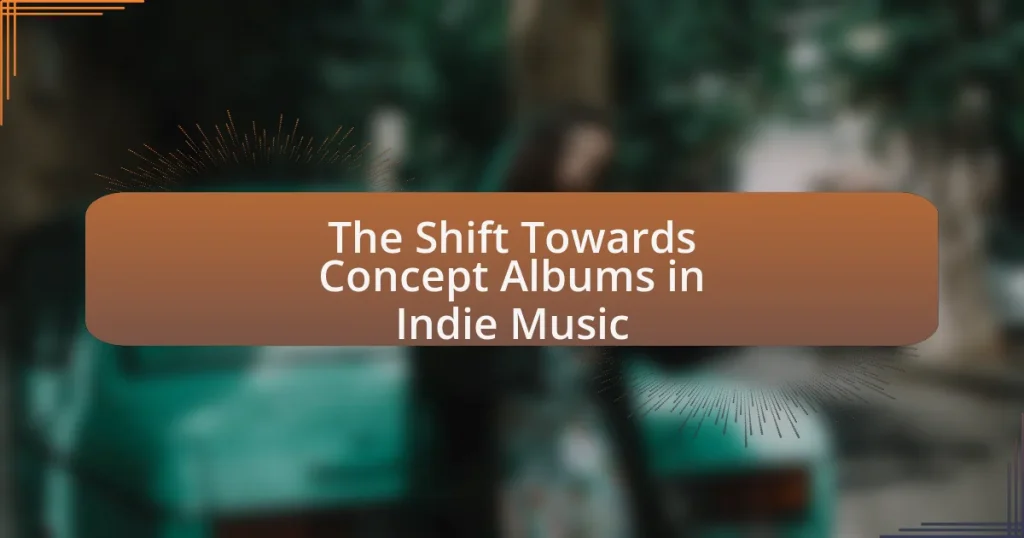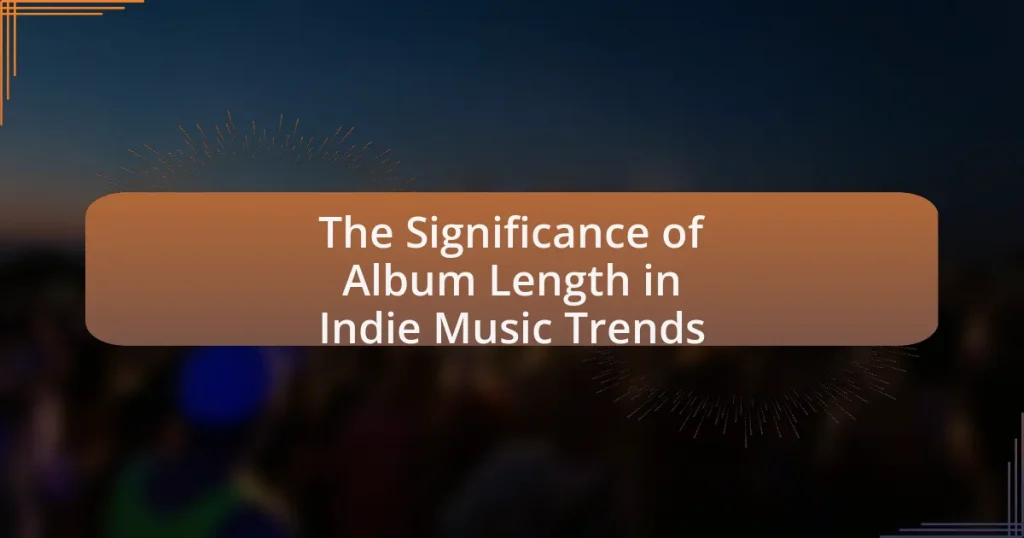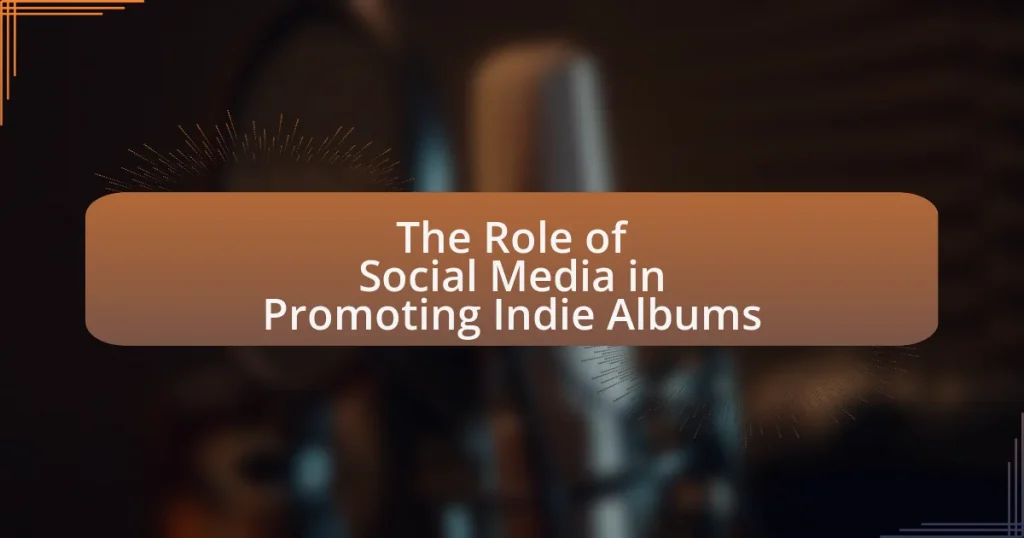The article examines how indie artists are navigating copyright challenges in the digital age, highlighting the dual nature of opportunities and risks presented by digital distribution and social media. It outlines key challenges faced by indie artists, including limited resources for copyright enforcement and the complexities of copyright registration. The piece discusses the impact of digital platforms on revenue and rights retention, the importance of understanding copyright laws, and strategies for protecting intellectual property. Additionally, it addresses emerging trends in copyright, such as digital rights management and blockchain technology, which may shape the future landscape for indie musicians.
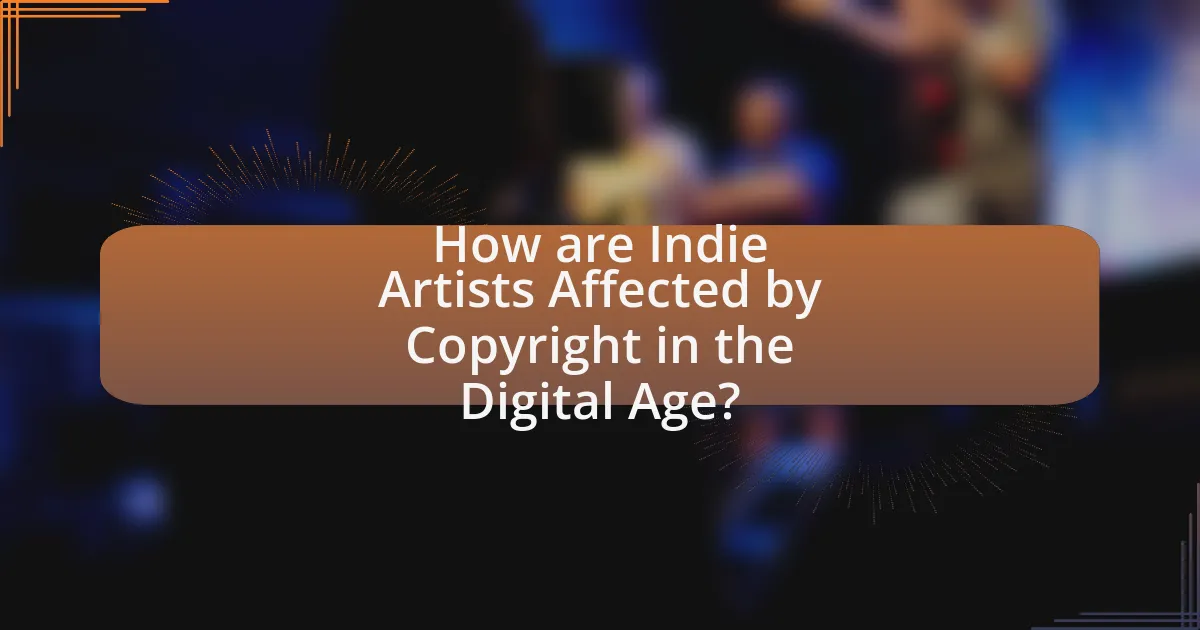
How are Indie Artists Affected by Copyright in the Digital Age?
Indie artists are significantly affected by copyright in the digital age as they face challenges in protecting their intellectual property while also navigating the complexities of digital distribution. The rise of streaming platforms and social media has made it easier for indie artists to share their work, but it has also increased the risk of unauthorized use and piracy. According to a 2021 report by the International Federation of the Phonographic Industry, 70% of music consumption occurs through streaming, which often results in lower revenue for artists due to the way royalties are distributed. Additionally, indie artists may struggle to enforce their copyright due to limited resources compared to larger labels, making it difficult to pursue legal action against infringement. This duality of opportunity and risk highlights the precarious position of indie artists in the current digital landscape.
What are the key challenges indie artists face regarding copyright?
Indie artists face significant challenges regarding copyright, primarily due to a lack of resources and knowledge about copyright laws. Many indie artists struggle to navigate the complexities of copyright registration, which can lead to unprotected works and potential infringement. Additionally, the digital landscape complicates enforcement, as unauthorized distribution of music online is rampant, making it difficult for artists to claim their rights. According to a 2021 survey by the Music Industry Research Association, 70% of independent musicians reported concerns about copyright infringement, highlighting the pervasive nature of this issue in the indie music community.
How does digital distribution impact copyright for indie artists?
Digital distribution significantly impacts copyright for indie artists by providing them with greater control over their work and enabling direct access to global audiences. This shift allows indie artists to retain more rights and revenue compared to traditional distribution methods, where record labels often held substantial control. According to a 2021 report by the International Federation of the Phonographic Industry, independent artists earned approximately 30% of their revenue from digital platforms, highlighting the financial benefits of digital distribution. Additionally, platforms like Bandcamp and SoundCloud empower artists to manage their copyrights more effectively, allowing them to set their own terms for licensing and sales. This democratization of distribution fosters a more equitable landscape for indie artists, enhancing their ability to protect and monetize their creative output.
What role does social media play in copyright issues for indie artists?
Social media significantly influences copyright issues for indie artists by providing a platform for exposure while simultaneously increasing the risk of unauthorized use of their work. Indie artists often share their music, artwork, and other creative content on platforms like Instagram, TikTok, and YouTube, which can lead to greater visibility and audience engagement. However, this exposure also makes their work more susceptible to copyright infringement, as users may share or remix content without permission. According to a 2021 study by the International Federation of the Phonographic Industry, 70% of artists reported concerns about their work being used without authorization on social media. This duality highlights the need for indie artists to understand copyright laws and actively protect their intellectual property while leveraging social media for promotion.
Why is understanding copyright important for indie artists?
Understanding copyright is crucial for indie artists because it protects their creative works from unauthorized use and ensures they receive proper recognition and compensation. Copyright law grants artists exclusive rights to their music, artwork, and other creations, allowing them to control how their work is distributed and monetized. For instance, the U.S. Copyright Office states that copyright protection is automatic upon the creation of a work, which underscores the importance of understanding these rights to prevent infringement and exploitation. By being knowledgeable about copyright, indie artists can navigate licensing agreements, avoid legal disputes, and maximize their revenue streams in the competitive digital landscape.
What are the potential legal consequences of copyright infringement?
The potential legal consequences of copyright infringement include monetary damages, statutory damages, and injunctive relief. When an individual or entity infringes on copyright, the copyright holder can sue for actual damages, which may include lost profits, or statutory damages that can range from $750 to $30,000 per work infringed, depending on the circumstances. In cases of willful infringement, damages can increase to $150,000 per work. Additionally, courts may issue injunctions to prevent further infringement, which can significantly impact the infringer’s ability to use the copyrighted material. These legal repercussions are established under the U.S. Copyright Act, which aims to protect the rights of creators and deter unauthorized use of their works.
How can copyright knowledge empower indie artists in their careers?
Copyright knowledge empowers indie artists by enabling them to protect their creative works, ensuring they receive proper recognition and financial compensation. Understanding copyright laws allows artists to navigate licensing agreements effectively, preventing unauthorized use of their music or art. For instance, the U.S. Copyright Office reports that registered works can lead to statutory damages and attorney fees in infringement cases, which underscores the financial benefits of copyright registration. Additionally, knowledge of copyright can help indie artists leverage their rights in negotiations with record labels, streaming platforms, and other entities, ultimately enhancing their career sustainability and growth.
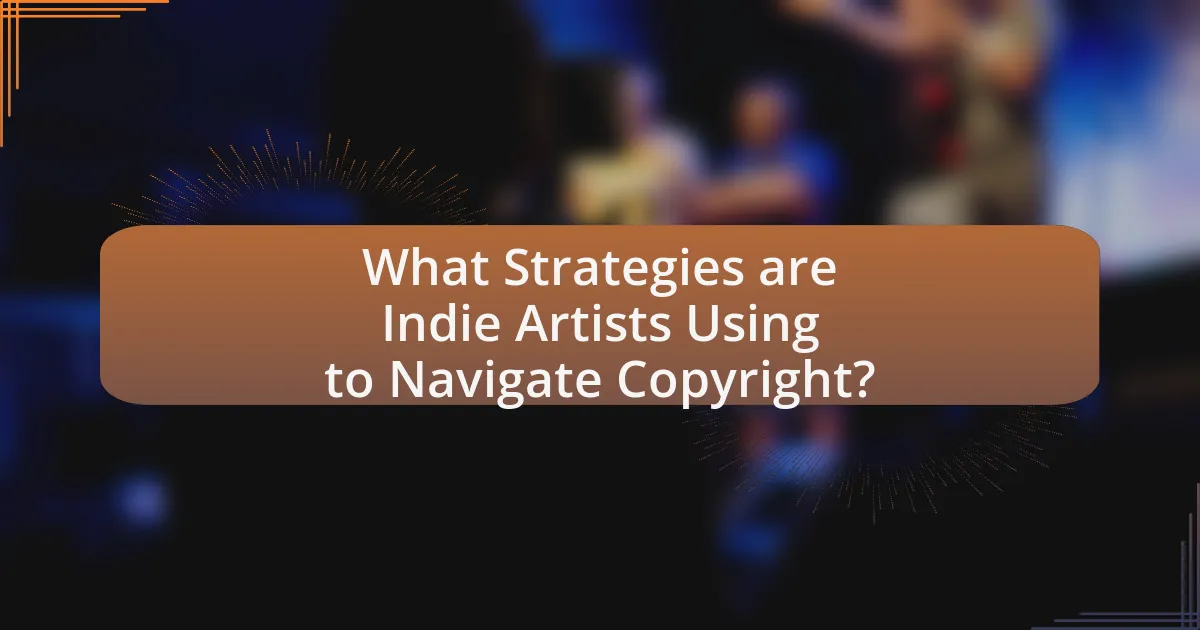
What Strategies are Indie Artists Using to Navigate Copyright?
Indie artists are employing several strategies to navigate copyright, including utilizing Creative Commons licenses, registering their works with copyright offices, and leveraging digital distribution platforms that offer built-in copyright protection. Creative Commons licenses allow artists to specify how their works can be used by others, providing a flexible approach to sharing while retaining certain rights. Registering works with copyright offices establishes a public record of ownership, which can be crucial in legal disputes. Additionally, digital distribution platforms like Bandcamp and SoundCloud often include features that help protect artists’ rights and manage their intellectual property, ensuring that they receive proper credit and compensation for their work. These strategies collectively empower indie artists to maintain control over their creations in an increasingly digital landscape.
How do indie artists protect their work in the digital landscape?
Indie artists protect their work in the digital landscape primarily through copyright registration, digital rights management (DRM), and utilizing platforms that offer protection features. Copyright registration provides legal recognition of ownership, allowing artists to take legal action against unauthorized use. Digital rights management tools help control how their work is distributed and accessed online, preventing unauthorized copying and sharing. Additionally, many indie artists leverage platforms like Bandcamp and SoundCloud, which include built-in copyright protections and allow artists to set specific licensing terms for their music. These measures collectively help indie artists safeguard their intellectual property in an increasingly digital world.
What are the best practices for registering copyright for indie music?
The best practices for registering copyright for indie music include completing the registration process with the U.S. Copyright Office, which provides legal protection for original works. Indie artists should ensure they fill out the appropriate forms, such as Form PA for performing arts, and pay the required fee, which is typically around $45 for online submissions. Additionally, artists should keep detailed records of their creation process, including drafts and notes, to establish proof of authorship. Registering as soon as possible after creation is crucial, as it allows for statutory damages and attorney fees in case of infringement. According to the U.S. Copyright Office, registration is not mandatory but is highly recommended for legal protection and enforcement of rights.
How can indie artists utilize Creative Commons licenses?
Indie artists can utilize Creative Commons licenses by selecting a license that aligns with their distribution and usage goals, allowing them to share their work while retaining certain rights. For instance, by choosing a Creative Commons Attribution license, artists permit others to use their work commercially as long as they provide proper credit, which can enhance visibility and reach. This approach is supported by the fact that Creative Commons licenses have been adopted widely, with millions of works available under these licenses, facilitating collaboration and creative sharing in the digital landscape.
What resources are available for indie artists to understand copyright?
Indie artists can access several resources to understand copyright, including the U.S. Copyright Office website, which provides comprehensive information on copyright registration and protections. Additionally, organizations like the American Society of Composers, Authors and Publishers (ASCAP) and the Broadcast Music, Inc. (BMI) offer educational materials and workshops focused on copyright issues. Furthermore, online platforms such as Coursera and Udemy feature courses specifically designed to educate artists about copyright law and its implications for their work. These resources collectively equip indie artists with the knowledge necessary to navigate copyright in the digital age effectively.
Which organizations provide support and information on copyright issues?
Organizations that provide support and information on copyright issues include the U.S. Copyright Office, the Copyright Clearance Center, and the American Society of Composers, Authors, and Publishers (ASCAP). The U.S. Copyright Office offers resources and guidance on copyright registration and law, while the Copyright Clearance Center facilitates licensing and permissions for copyrighted materials. ASCAP supports songwriters and composers by managing performance rights and providing educational resources on copyright. These organizations play a crucial role in helping individuals and entities understand and navigate copyright laws effectively.
How can online courses and workshops enhance copyright knowledge?
Online courses and workshops can significantly enhance copyright knowledge by providing structured, accessible, and up-to-date information on copyright laws and practices. These educational formats often include expert-led sessions that cover essential topics such as fair use, licensing, and the implications of digital distribution, which are crucial for indie artists navigating copyright in the digital age. For instance, a study by the Copyright Office found that artists who participated in educational programs reported a 40% increase in their understanding of copyright issues. This demonstrates that targeted learning opportunities can effectively equip individuals with the necessary skills and knowledge to protect their creative works.
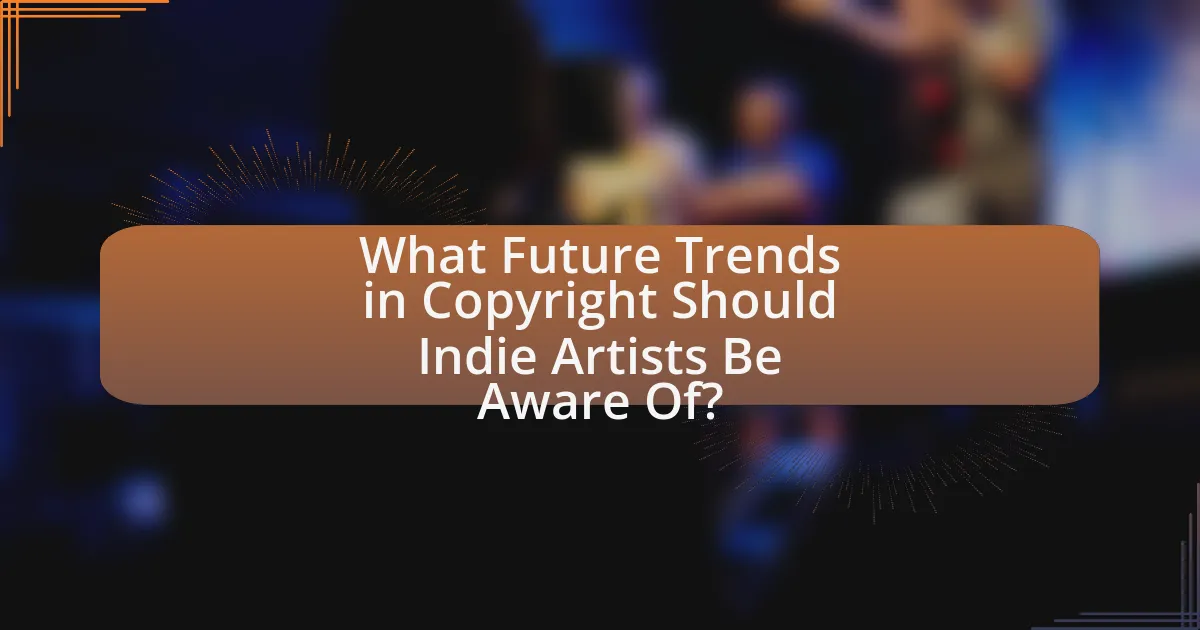
What Future Trends in Copyright Should Indie Artists Be Aware Of?
Indie artists should be aware of the increasing importance of digital rights management (DRM) and the potential for blockchain technology to revolutionize copyright enforcement. As streaming services dominate music consumption, DRM tools are evolving to protect artists’ rights and ensure fair compensation. Additionally, blockchain offers a transparent and immutable way to track ownership and royalties, which can help indie artists secure their intellectual property more effectively. According to a report by the World Intellectual Property Organization, the integration of blockchain in copyright management could streamline royalty distribution and reduce disputes, making it a significant trend for indie artists to monitor.
How is technology changing the landscape of copyright for indie artists?
Technology is transforming the landscape of copyright for indie artists by providing them with new tools for distribution, protection, and monetization of their work. Digital platforms like Bandcamp and SoundCloud enable indie artists to share their music directly with audiences, bypassing traditional gatekeepers and allowing for greater creative control. Additionally, blockchain technology offers a decentralized method for tracking ownership and usage rights, which can enhance transparency and reduce piracy. According to a 2021 report by the International Confederation of Societies of Authors and Composers, the rise of digital distribution has led to a 30% increase in revenue for independent musicians, demonstrating the significant impact of technology on their copyright landscape.
What impact do emerging platforms have on copyright enforcement?
Emerging platforms significantly complicate copyright enforcement by creating new avenues for content distribution that often bypass traditional legal frameworks. These platforms, such as social media and streaming services, enable rapid sharing and remixing of copyrighted material, which can lead to widespread infringement. For instance, a study by the European Union Intellectual Property Office in 2020 found that 30% of internet users reported accessing copyrighted content without authorization, highlighting the challenges faced by copyright holders in monitoring and enforcing their rights in this digital landscape. Additionally, the decentralized nature of many emerging platforms makes it difficult for copyright owners to identify and take action against infringing content, further undermining enforcement efforts.
How might changes in copyright law affect indie artists in the future?
Changes in copyright law may significantly impact indie artists by altering their ability to protect and monetize their work. For instance, more stringent copyright protections could enhance indie artists’ control over their music, allowing them to secure better licensing deals and royalties. Conversely, if copyright laws become more lenient, it could lead to increased unauthorized use of their work, diminishing their revenue potential. Historical trends indicate that shifts in copyright legislation, such as the Digital Millennium Copyright Act of 1998, have previously influenced how artists engage with digital platforms, affecting their income and exposure. Thus, the future landscape for indie artists will largely depend on the direction of these legal changes.
What practical tips can indie artists follow to navigate copyright effectively?
Indie artists can navigate copyright effectively by registering their works with the U.S. Copyright Office, which provides legal protection and establishes ownership. This registration is crucial because it allows artists to enforce their rights in case of infringement and can lead to statutory damages and attorney fees if they need to pursue legal action. Additionally, indie artists should utilize Creative Commons licenses to clarify how others can use their work, which can help in promoting their music while retaining certain rights. Keeping detailed records of all creative processes, including drafts and correspondence, further strengthens their claims to ownership. Lastly, staying informed about copyright laws and changes, as well as utilizing resources from organizations like the American Society of Composers, Authors, and Publishers (ASCAP), can provide valuable guidance and support in navigating the complexities of copyright in the digital age.
How can indie artists stay updated on copyright changes and trends?
Indie artists can stay updated on copyright changes and trends by regularly following reputable sources such as the U.S. Copyright Office, music industry blogs, and legal websites that specialize in intellectual property. These platforms provide timely updates on legislative changes, case law, and best practices. For instance, the U.S. Copyright Office publishes newsletters and reports that detail recent developments in copyright law, which can be crucial for artists to understand their rights and obligations. Additionally, joining professional organizations like the American Society of Composers, Authors and Publishers (ASCAP) or the Recording Academy can offer access to resources, workshops, and networking opportunities that focus on copyright issues.
What are the common pitfalls to avoid regarding copyright for indie artists?
Indie artists commonly face pitfalls regarding copyright, including failing to register their works, misunderstanding fair use, and neglecting to secure licenses for samples. Failing to register can lead to difficulties in enforcing rights, as unregistered works may not qualify for statutory damages or attorney fees in infringement cases. Misunderstanding fair use can result in unintentional infringement, as artists may incorrectly assume their use of copyrighted material is permissible without proper analysis. Additionally, neglecting to secure licenses for samples can lead to legal disputes and financial penalties, as using unlicensed material can infringe on the original creator’s rights. These pitfalls highlight the importance of understanding copyright laws to protect artistic work effectively.
